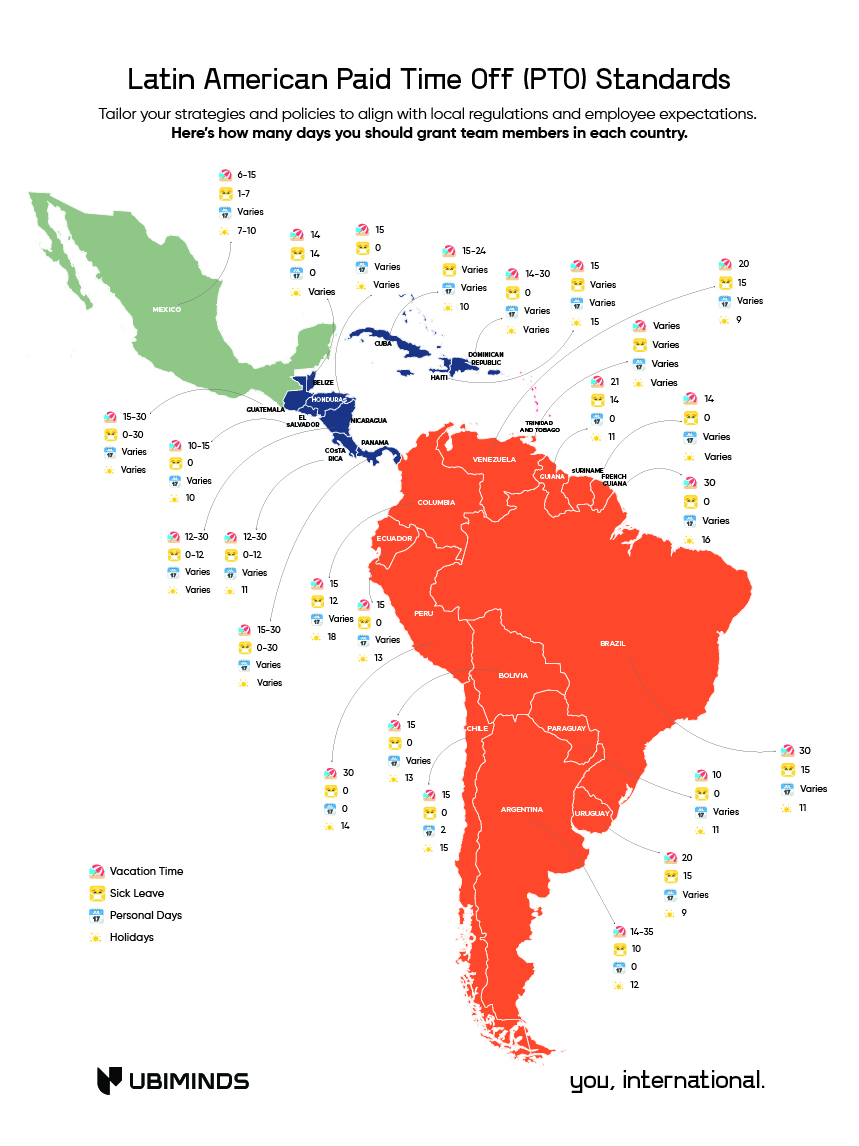Optimizing paid time off (PTO) is crucial for SaaS companies expanding into LatAm. By aligning with local PTO norms, you can offer competitive employee benefits, fostering a positive culture and ensuring your team enjoys the right balance between work, vacation, and time off work.
[ez-toc]Understanding the various local PTO norms in LatAm helps your SaaS company align with regional labor laws while ensuring compliance with time off work regulations. Learn how to foster a positive work culture and prioritize work-life balance. Dive into our guide to optimize employee benefits and build harmonious work environments.
The Importance of Paid Time Off in SaaS Expansion to LatAm
Paid Time Off is essential for SaaS companies expanding into Latin America because it helps establish a competitive advantage in attracting and retaining top talent while aligning with local labor laws and cultural expectations. In LatAm, PTO policies often differ significantly from those in other regions, making it critical for companies to adapt to local norms to ensure compliance, boost employee satisfaction, and build a positive work culture.
Key Reasons Why PTO Matters for SaaS Expansion into LatAm
Offering competitive SaaS employee perks like generous PTO packages that align with local norms can significantly boost employee satisfaction and retention, but also contributes to:
- Compliance with Local Labor Laws: LatAm countries have strict regulations surrounding paid time off, including vacation days, holidays, and sick leave. Adapting to these legal frameworks avoids potential penalties and helps businesses operate smoothly.
- Improved Employee Retention and Satisfaction: Offering competitive PTO packages that respect local customs and preferences enhances employee well-being and loyalty. Employees in LatAm value a balance between work and personal life, and robust PTO policies help create this balance, reducing turnover.
- Cultural Alignment: In LatAm, weekends and holidays hold significant cultural importance, and respecting local PTO norms such as these demonstrates cultural sensitivity. Adapting policies to include time off during local festivals and holidays fosters goodwill and a positive workplace atmosphere.
- Boosting Productivity and Well-Being: Encouraging employees to take regular vacation and time off work helps reduce burnout and stress, ultimately leading to better performance and innovation. For SaaS companies, this is particularly important in maintaining a high-functioning workforce capable of driving growth.
Overall, optimizing PTO for a LatAm expansion strategy not only ensures compliance and attracts talent but also nurtures a healthy, productive work culture.

Maintaining a balance between productivity and well-being is essential for distributed teams. Without the right balance, teams risk burnout, reduced morale, and decreased performance. Photo by Austin Distel.
Legal Considerations for Paid Time Off in Latin America
Each country in Latin America has its own legal requirements for PTO and vacation policy in LatAm, which must be considered when building a compliant and attractive PTO framework for SaaS companies.
The tech industry often employs a mix of full-time employees and contractors, making compliance even more important. Here are some important legal considerations:
1. Mandatory Vacation Days
Each country in Latin America has its own legal requirements regarding vacation days:
- Brazil: Employees are entitled to 30 days of paid vacation after one year of employment, which can be split into up to three periods.
- Mexico: New employees receive six days of vacation after the first year, increasing by two days every year up to a maximum of 12.
- Argentina: Employees are entitled to 14 days of paid vacation after one year, with increases based on tenure.
- Chile: The minimum vacation entitlement is 15 working days per year, though this varies based on contract type and role.
Companies must ensure that their PTO policies align with these legal minimums while offering competitive perks to attract top talent in the tech sector.
2. Holiday Pay
Latin American countries have designated public holidays that employers must respect:
- Mexico mandates seven federal holidays, including Independence Day and Labor Day.
- Brazil has 12 national holidays, with additional state holidays.
- Chile has more than 15 public holidays.
Not all holidays are paid, but in most countries, if an employee works on a holiday, they are entitled to premium pay (often 2x or 3x their usual rate).
3. Sick Leave
Sick leave regulations also vary. In most Latin American countries:
- Employees are entitled to paid sick leave under government or employer health insurance systems.
- For example, Mexico requires employees to provide a medical certificate to be eligible for paid sick leave, which is typically 60% of their salary after the fourth day.
4. Maternity and Paternity Leave
Maternity and paternity leave policies are more generous in Latin America compared to many other regions:
- Brazil offers 120 days of paid maternity leave and up to 20 days of paid paternity leave.
- Argentina provides 90 days of maternity leave and 2 days of paternity leave.
Tech companies should ensure their PTO policies include legally mandated parental leave while considering additional family-friendly benefits to support their employees.
5. Independent Contractors
Many tech companies rely on independent contractors in Latin America. However, contractors are generally not entitled to statutory PTO benefits like full-time employees. However, some companies offer voluntary PTO to contractors to remain competitive and retain top talent.
6. Hybrid and Remote Work
With the rise of remote work in the tech sector, companies must ensure that their PTO policies apply equally to remote and in-office employees. It’s important to note that the legal framework for remote work is evolving in many LatAm countries, particularly when it comes to defining employment conditions, working hours, and paid leave.
PTO Standards per Country
Explore the prevalent PTO norms and legal requirements and tailor your strategies and policies to align with local regulations and employee expectations. Here are some nuances to be aware of:

Adapting PTO Policies for Remote Teams
With the rise of remote work in SaaS, it’s crucial to ensure your paid time off policy is adaptable to both full-time employees and independent contractors. Offering the same benefits across your distributed teams will help foster a sense of equality and trust. Software companies with remote teams need to adapt their policies to account for the unique challenges of distributed workforces. Here’s how they can do it:
1. Customize PTO Policies Based on Location
Remote teams often work across various regions with differing legal requirements for PTO. Software companies should adapt their policies to ensure compliance with local labor laws. This includes recognizing local holidays, vacation accrual rates, and regulations around sick leave.
For example, if a team member works remotely from a country in Latin America (LatAm), the company should adhere to local PTO norms, which may be more generous than those in other regions.
2. Offer Flexible PTO Usage
Flexibility is key when managing remote teams. Encourage employees to take time off work when they need it, without being bound by strict dates or schedules. Offering flexibility to take PTO during weekends, holidays, or non-standard vacation times helps remote employees balance work and personal life, which is crucial for their well-being.
3. Implement a Universal PTO Policy
While it’s important to adapt to local laws, software companies should also strive for a universal PTO baseline across their remote teams. This creates consistency and fairness across the company, making sure that no employee feels short-changed due to their location. For example, companies can offer a fixed number of vacation days, with the option for additional days based on local laws.
4. Encourage Digital Tools for PTO Tracking
Using tools like Slack, Trello, or dedicated time management software can help employees easily request and track their time off. Clear communication around PTO availability ensures that all team members and managers are on the same page regarding upcoming absences, minimizing disruptions to workflows.
5. Support Mental Health and Work-Life Balance
Since remote work can blur the boundaries between work and personal life, software companies should encourage employees to take full advantage of their PTO to avoid burnout. This includes promoting mental health days and integrating wellness programs that support employees’ mental and physical well-being.
For SaaS companies, maintaining a healthy work-life balance for tech companies is essential to productivity and innovation, especially when considering PTO policies that align with cultural expectations.
Crafting Flexible and Culturally Relevant PTO Policies
To meet employee needs, offer a comprehensive paid time off policy, including vacation, weekends, and personal time off that reflects the expectations in Latin America. Create flexible policies that accommodate cultural festivities and individual preferences, enhancing employee satisfaction.
Want to build a harmonious work culture without compromising deliverables? Start by implementing a comprehensive Paid Time Off Policy covering Full-Time Employees (FTEs), Independent Contractors (ICs), and other contributors. It should include:
- Vacation Time: Encourages extended breaks for relaxation and travel.
- Sick Leave: Supports employees during health challenges, ensuring their well-being.
- Personal Days: Allows flexibility for personal obligations and mental health breaks.
- Holidays: Acknowledges cultural and national festivities for diverse celebrations.
Creating PTO policies that respect local PTO norms is essential to building a strong foundation for remote work and improving employee retention, fostering a positive workplace culture.
Effective Communication of PTO Policies to Your Team
Ensuring transparency around paid time off policies, such as accrual rates and eligibility, builds trust, especially in distributed teams. Ensure transparency regarding accrual rates, eligibility criteria, and the process for requesting time off. Open dialogue fosters trust and reduces ambiguity.
For SaaS companies, promoting a culture that emphasizes regular time off work and recognizing national weekends contributes to higher productivity and overall satisfaction. Empower your software teams to achieve a balanced work-life equation:
- Implement Flexible Schedules: Allow flexible working hours to accommodate personal commitments.
- Encourage Breaks: Promote regular breaks during the workday for improved productivity.
- Utilize Collaboration Tools: Leverage video conferencing and project management tools for efficient communication.
- Apply Health and Wellness Initiatives: Introduce health benefits to support physical and mental well-being.
- Do Regular Review Cycles: Periodically assess and enhance policies based on employee feedback.
Employees who regularly use their paid time off for vacation or mental health days are more engaged and less prone to burnout. Remember to lead by example to demonstrate the value of relaxation and rejuvenation, positively impacting productivity and morale.
Regular Review and Enhancement
Continuously evaluate PTO policies based on employee feedback and changing work dynamics. Adapt policies to meet evolving needs, ensuring they remain competitive and aligned with employee expectations.
Crafting effective paid time off strategies for your SaaS expansion in Latin America enhances employee satisfaction, productivity, and retention rates. Prioritizing work-life balance through comprehensive PTO policies contributes significantly to a positive workplace culture.
Regular communication around PTO ensures that employees in different countries feel confident about when and how they can take their time off work.
How Ubiminds’ Statements of Work (SOWs) Typically Look in Terms of Paid Time Off (PTO)
With Ubiminds, you navigate international markets with full support, ensuring smooth operations. Our Talent-as-a-Service (TaaS) model provides access to skilled talent without borders, streamlining your workforce.
Ubiminders typically adhere to a regular monthly schedule aligned with your company’s standard business hours, maintaining an average workload of one hundred and sixty (160) hours per month.
The availability of our personnel is contingent upon your official policies governing US federal holidays, or at the Ubiminder’s work location – it’s your call.
We recommend that following each 30-day period of dedicated service, they be entitled to 16 cumulative hours of paid personal time off, with scheduling arrangements to be mutually agreed upon with their direct manager at your company.
What Else Do We Do at Ubiminds?
At Ubiminds, we go beyond mere recruitment; we’re your on-the-ground partner specializing in untangling compliance. Here’s how we help North American companies build their teams with Latin American product and engineering specialists:
- Hiring Software Engineers in Latin America: We source top talent to enhance your team with skilled professionals. Our staff augmentation services provide flexible, scalable solutions tailored to your needs.
- Facilitating Collaboration within Distributed Teams: We optimize team dynamics for peak performance and project success. Benefit from nearshore advantages, reducing time-zone challenges and operational costs.
- Risk Mitigation: We facilitate Saas team expansion with software team workforce planning and execution. Trust us to navigate the regulatory framework and mitigate risks in talent acquisition.
Interested in refining your PTO strategies for SaaS company growth in Latin America? Dive deeper into our guide to optimize employee benefits and foster a harmonious work environment.

International Marketing Leader, specialized in tech. Proud to have built marketing and business generation structures for some of the fastest-growing SaaS companies on both sides of the Atlantic (UK, DACH, Iberia, LatAm, and NorthAm). Big fan of motherhood, world music, marketing, and backpacking. A little bit nerdy too!


